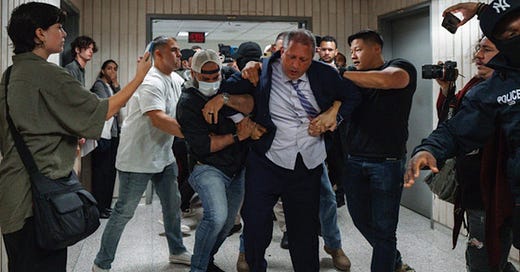Week 32 - The Return
Experts in authoritarianism advise to keep a list of things subtly changing around you, so you'll remember.
This was a troubling and chaotic week for our country. At home, political violence continued to unfold, as a Minnesota man carried out a gruesome assassination of a Democratic state representative and her husband, and injured another Democrat as well, both on his long list of targeted individuals. An act of political violence would normally be a moment for the president to call for calm and a lowering of tensions. Trump, however, did the exact opposite. We are also observing a disturbing, growing trend of Democratic officials being manhandled and arrested in public view by federal immigration agents, and a Department of Homeland Security that only further escalates, rather than apologizing. As the week came to a close, Sen. Tina Smith (D-MN) wondered, “Do the members of Congress need security details to defend themselves from the executive branch? God, I hope not.”
Trump finally got his long sought after military parade, but as I wrote here, it was a day of humiliation. His parade drew mere thousands to Washington D.C., and Trump could be seen pouting at the mundanity of it all! Magnifying the failure of his event, on that same day, millions of Americans protested at more than 2,000 demonstrations in 50 states in what was dubbed ‘No Kings’ protests. Trump’s military parade also highlighted dichotomies in his deployment of U.S. military forces: Trump has deployed nearly 5,000 National Guard and Marine troops to Los Angeles, while being reluctant to send troops to battle alongside Israel in one of his long-stated goals of ending Iran’s nuclear program. While the Republican Party had a very public rift over U.S. involvement in the Middle East, Trump appeared indecisive and uncertain, and questions arose about whether his National Security Council, now composed mostly of loyalists, was up to the task.
Notably this week, Trump’s polling numbers are falling, with his net approval matching its low point for this second regime. He is also seeing public approval of his number one issue, immigration, fall below 50% in most polls, and his so-called big, beautiful bill is highly unpopular, with two polls finding approval in the 20s. As we hit the 70th day of Trump’s 90 day pause, the regime has yet to finalize a single trade deal, and the U.S. dollar, a measure of global perception of Trump, continued to fall, now down 10%.
Quinnipiac Polls found Trump’s approval at the lowest of the second regime so far, with 38% approving and 54% disapproving. Just 43% approve of his handling of the issue of immigration, and 40% approve of deportations. Just 27% approve of his tax bill.
An NBC News poll found 81% of U.S. adults say that if a federal court rules that an action is illegal, then the Trump regime has to follow its ruling. Among Trump supporters, the opinion was split 50%-50%, while 87% of Independents and 96% of Democrats agree.
WAPO reported that for the first time in at least half a century, more people will leave the U.S. than arrive in 2025, citing a sharp decrease in people coming into the country, more so than Trump’s deportations. Economists say the net outflow of migrants could stoke inflation and stall growth.
On Monday, a federal judge found the Trump regime’s cuts to NIH funding were “void and illegal,” citing the regime arbitrarily canceled more than $1 billion in research grants because of their perceived connection to DEI initiatives. The judge reinstated the grants.
Judge William Young, who was appointed by Ronald Reagan, said in his four decades on the bench he had “never seen a record where racial discrimination was so palpable,” adding, “Any discrimination by our government is so wrong that it requires the court to enjoin it.”
The NAACP said it would not invite Trump to its national convention, breaking the largest and oldest civil rights organization’s 116 year tradition, citing, “Trump is attacking our democracy and our civil rights.”
WAPO reported the Trump regime is taking steps to scrap the traditional system of a nonpartisan, merit-based civil service, and replacing it with a system that hires and rewards loyalty to Trump and his agenda. Civil servants say the changes underway could upend the workforce.




